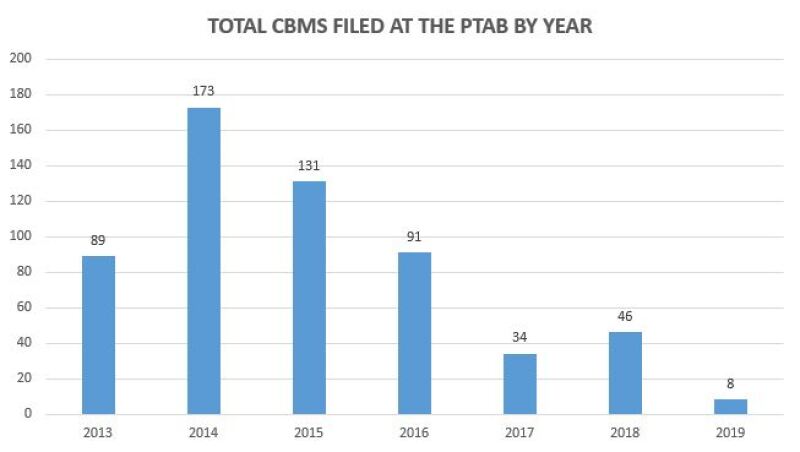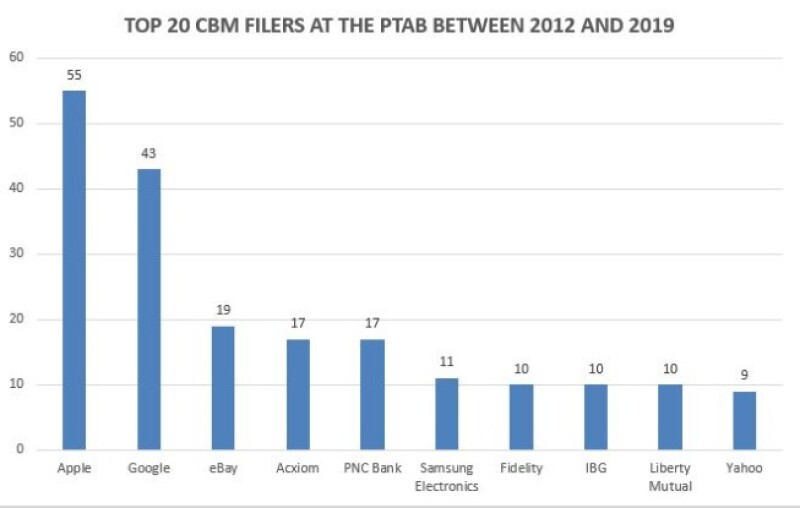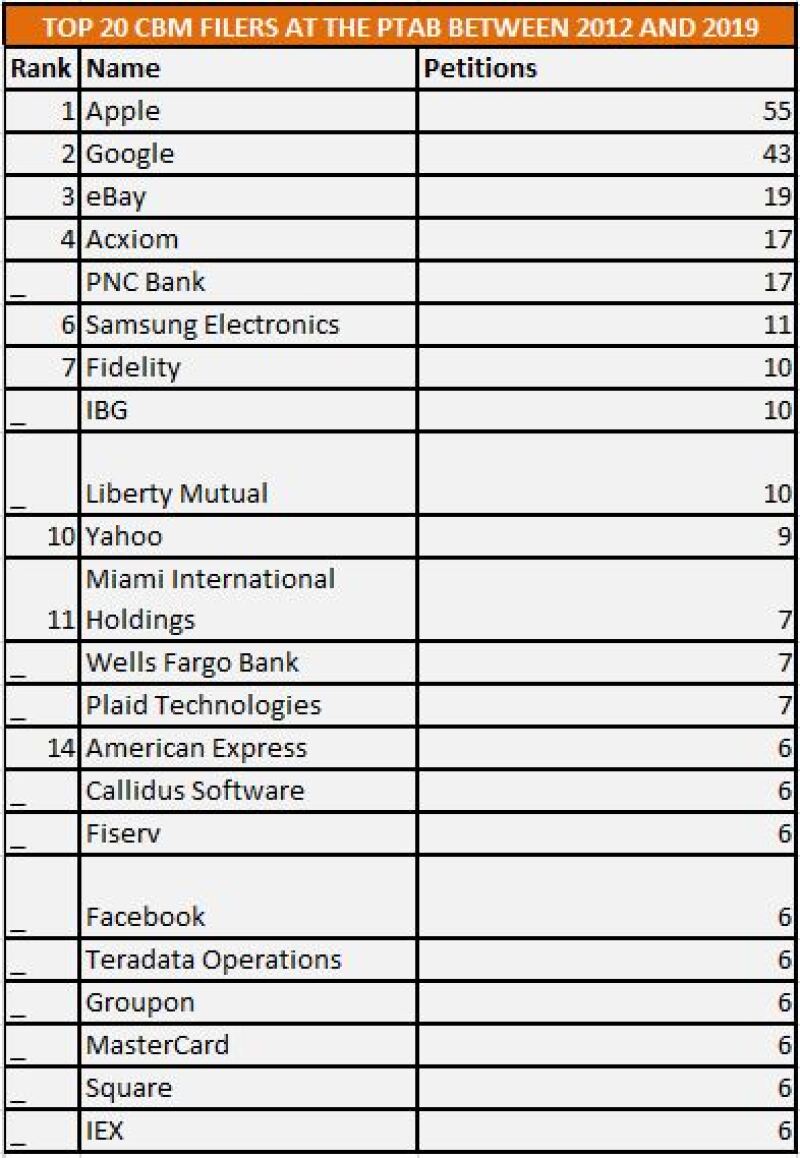The covered business method programme at the Patent Trial and Appeal Board should be extended, but only if its overall effectiveness could be somehow restored, according to counsel at financial services companies.
CBMs were established by the America Invents Act (AIA) to create an efficient way to invalidate the numerous ‘low-quality’ patents issued in the late 1990s and early 2000s covering methods of doing business in the financial sector.
The post-grant proceeding was highly sought after by those in the financial services industry, and proved to be a fairly popular tool shortly after the PTAB’s inception. Businesses filed 89 CBMs in 2013 – the PTAB’s first full year in operation – and then 173 in 2014 and 131 the year after.
Just over 580 CBMs have been filed between 2012 and 2019.

The CBM programme is set to expire in less than seven months. AIA legislators reasoned that it should not take longer than seven to eight years to invalidate the ‘bad patents’ CBMs were intended to target and thus that the programme should not last indefinitely.
But despite the programme’s initial popularity and calls from some to prolong the life of CBMs, few industry stakeholders have been keen to champion an extension of the proceeding type, even though they have had several opportunities to do so.
The US House Judiciary Courts, Intellectual Property and Internet Subcommittee held a hearing to discuss CBMs in March 2018, including their potential amendment or extension. Eleanor Yost, shareholder at law firm Carlton Fields, wrote in the Chicago-Kent Journal of Intellectual Property that testimony was a “far cry from the spirited debate about the programme” before the AIA’s passing.
A consensus on extending CBMs past their current sunshine date has subsequently yet to be reached.
The number of CBM petitions filed over the past three years (see above graph) indicates why this ambivalence was felt in Congress. Filings took a 62% drop in 2017 from the previous year – from 91 to 34 – and later suffered an even steeper 82% fall from 46 petitions in 2018 to just 8 in 2019.
The drop last year is, of course, at least partly due to the fact that the CBM programme is set to expire on September 16 2020 and few businesses will be keen to spend time and money on these post-grant proceedings so close to the deadline.
TOP CBM FILERS |
Data taken from the Docket Navigator database shows that overall, tech companies have been bigger users of the CBM system than traditional financial services companies. The top three most prolific users between 2012 and December 31 2019 were Apple (55 CBM petitions), Google (43) and eBay (19).

Apple and Google consistently rank in the top five users of the PTAB broadly. Within the top five CBM users list, only one (PNC Bank) could be considered to be a traditional financial services institution. Within the top 20, eight could be considered as such.

But fintech companies have also made good use of the CBM programme. Large firms Fiserv (revenue $17 billion) and Square ($3 billion) achieved joint 14th place alongside larger companies such as American Express and Facebook.
|
The road to ambivalence
Financial industry sources contend that the reason for this decline in CBM filings and related industry ambivalence to the programme’s survival is that a series of court rulings together stripped away the usefulness of this post-grant proceeding.
They explain that the PTAB instituted several CBMs over the years that were filed by technology companies looking to invalidate non-business method patents on inventions with clear and unambiguous technological aspects.
In several of these matters, the PTAB found in favour of the petitioner and thereby extended the scope of CBMs beyond what had been laid out in statute.
But in one case, Unwired Planet v Google, things were different. While the PTAB had found that a CBM could be filed against patents with claims that were incidental to financial activity, the US Court of Appeals for the Federal Circuit reversed the first instance judgment and narrowed the types of patents that were eligible for CBMs.
This decision raised the bar for CBM eligibility while leaving a split among PTAB panels regarding the proper eligibility standards for the post-grant proceeding unresolved. Those that once campaigned for the CBM were subsequently left disillusioned.
“CBMs were ruined for financial services companies by the tech companies, who tried use the procedure for patents that were never intended to be covered by the legislation,” says the general counsel at a financial services company in New York.
“Sure, it would be nice to have CBM procedures that actually worked, but the courts completely gutted the proceeding because Google and others tried to extend it too far to cover them, so there’s little point in getting the existing procedure extended.
“Between the planned expiration of the transitional period and the court decisions that narrowly limited its usage, I don’t think anyone is still using CBMs.”
Another financial industry source agrees that CBMs were much more effective in the past than they are now, and that unless a serious effort is made to undo the past few years of case law, he and his colleagues are not particularly concerned about the programme’s expiration.
Lewis Popovski, partner at Patterson Belknap in New York, adds that the US Supreme Court’s decision in Alice v CLS Bank also made CBMs less valuable to businesses by giving litigators another means of invalidating patents on eligibility arguments.
Some use still
Not all financial businesses are as ambivalent about the expiration of CBMs, however. The head of IP at a fintech company says the end of CBMs will constitute the loss of one of his most effective and cost-efficient weapons against low-quality patents related to financial technologies.
“We have been huge beneficiaries of the CBM,” he says. “Unlike inter partes reviews, CBMs have the advantage of not being subject to a draconian estoppel principle, which means we can lose at the PTAB and still make an effective case in the district courts.”
He adds that he would like to see the good bits of CBMs, such as the provisions that allow parties to raise patent eligibility arguments at the PTAB, ported over to a different sort of post-grant proceeding, such as the IPR.
The financial industry source agrees that such a transfer of CBM provisions could be useful if it would allow him to mount arguments on written description and patent eligibility at the PTAB at the same time.
CBMs are a far cry from what they once were, and thus few stakeholders are particularly bothered about their survival.
But if the good parts of CBM proceedings were to be moved across to something else, or the proceedings were to be restored to their heyday in some other way, their glory could yet live on.











